Glassdoor: Viewing the Workplace Differently

Disrupting how you look at work with Glassdoor.
Built on the foundation of increasing workplace transparency, Glassdoor is a career and workplace community where users find and anonymously share real-time reviews, ratings and details about specific jobs in specific companies for free [1][2]. However, unlike other career sites, all of this information is shared by those who know a company best: employees. Initially launched as the self-dubbed “TripAdvisor of the workplace” in 2008, Glassdoor is now powered by millions of ratings and reviews, has grown to boast reviews and insights for more than one million companies located in more than 190 countries [3], and welcomes more than 55 million unique users each month [4].
In a market where users can easily multihome, the platform’s success is predicated on how it protects its most important architectural feature: trust.

Scaling Trust
Trust requires parties to feel comfortable to participate—users believe they are not putting their business, operation, or personal wealth at risk [5]. In Glassdoor’s case, the company is able to garner voluntary feedback by committing to protecting the integrity of the information and the anonymity and privacy its users, its default for shared data always being anonymous[6]. Engendering trust enables more data to be aggregated, which in turn helps create more reliable data, create more comprehensive insights, and, ultimately, drive more value for end users.
To maintain data integrity, every piece of content on Glassdoor is moderated through a two-step moderation process: technological and human-eye. Glassdoor’s proprietary tech filters and algorithms detect attempted abuse and gaming. Any Glassdoor member can flag a posted review for a second look and review and human moderators personally inspect content that is flagged for secondary review. Content that is not within Glassdoor’s Community Guidelines is removed, with 5% to 10% of reviews being rejected. Truthful, constructive reviews are encouraged, but disclosing confidential information or details irrelevant to expounding on workplace culture are not tolerated [7].
Additionally, employers cannot manipulate reviews. Glassdoor states that they never edit or alter the text of reviews or comments submitted on the site, no matter how minor, and do not suppress, filter or delete content simply because it is negative/lower-rated or positive/higher-rated[7].
In turn, employers have found their own value capture through the platform: a real-time barometer of internal satisfaction, compensation insights in the competitive market, and a comprehensive recruitment tool. Annual salary reviews and internal employee surveys reports are expensive and results can lag several months, and the ability to see current compensation data is extremely helpful in markets where salaries for positions in high demand can fluctuate widely in the course of just a few months [2]. Thus, employers are enabled to stay on top of issues and compensation trends while potentially gaining an edge in recruitment, retention and overall employee engagement.
Prescient Growth?
After launching in 2008, Glassdoor’s growing data uncovered voids competitors were not tapping into. Unique insights supported by data helped expand the platform’s strategically-timed breadth of services and products, creating a domino effect that has consequently strengthened its network effects and helped stave off competition (see timeline of features and 2020 DE&I product example in “Additional Information”).
For example, DE&I trends led Glassdoor to display company ratings, CEO ratings and workplace factor ratings by race/ethnicity, gender identity, parental or caregiver status, disability, sexual orientation and veteran status. Salaries were also broken out by gender identity and race/ethnicity [6].
Most recently, in conjunction with the pandemic’s push to remote and hybrid work, Glassdoor announced in 2021 its acquisition of Fishbowl, a fast-growing social network used by more than one million professionals. Launched in 2016, Fishbowl had amassed more than 18 million conversations, comments and direct messages in thousands of “bowls” where professionals could discuss career, industry and workplace-related topics [4]. Architecturally aligned on maintaining anonymity and trust, the coupling of Fishbowl and Glassdoor allowed job seekers and employers to see relevant conversations from people working in related companies and industries. This integration came as more than two-thirds (69%) of employees reported wanting to learn more about the team they would be working with when deciding to accept a job, and 64% of employees wishing they had a way to ask questions of industry peers around the country [4].
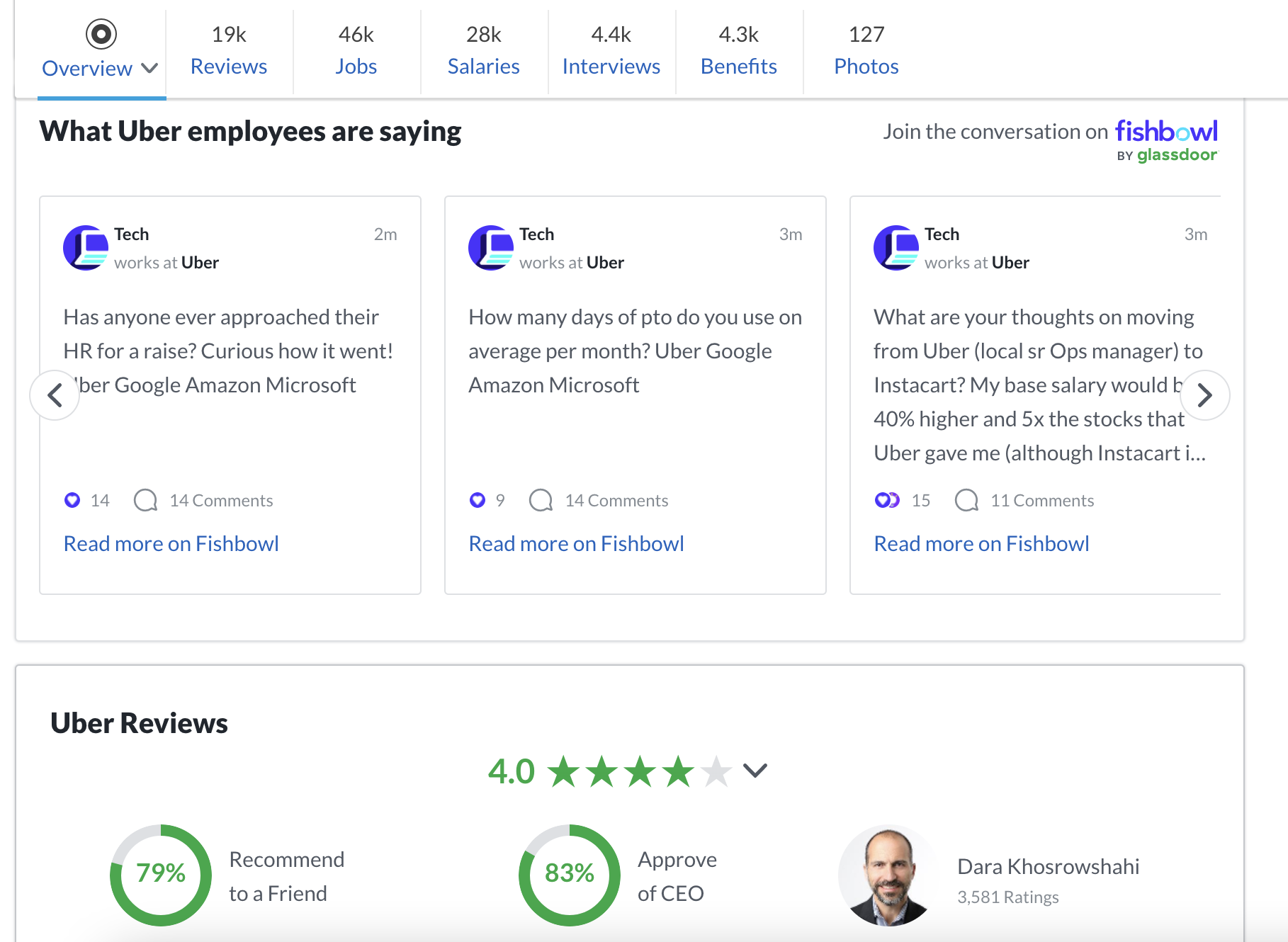
Source: https://www.glassdoor.com/Overview/Working-at-Uber-EI_IE575263.11,15.htm
Despite multihoming remaining a factor amongst market competitors (including the likes of LinkedIn, Indeed.com, and others), Glassdoor continues to seek opportunities that help tip the market in its favor. The push to piggy-back off of real-time conversations and an established mobile community is Glassdoor’s most recent risk that may or may not pay off.
Additional Information
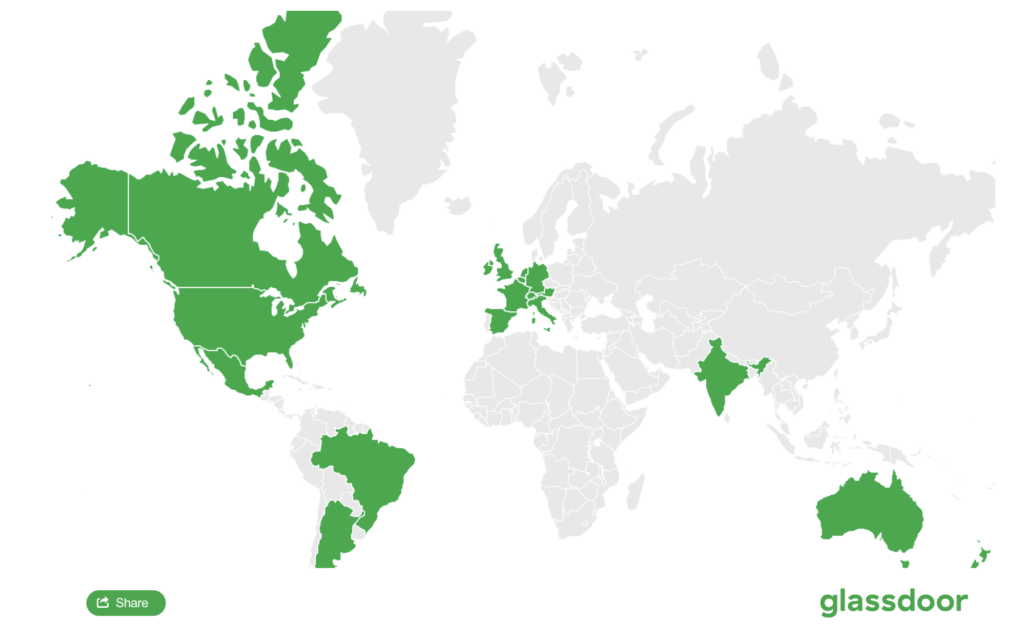
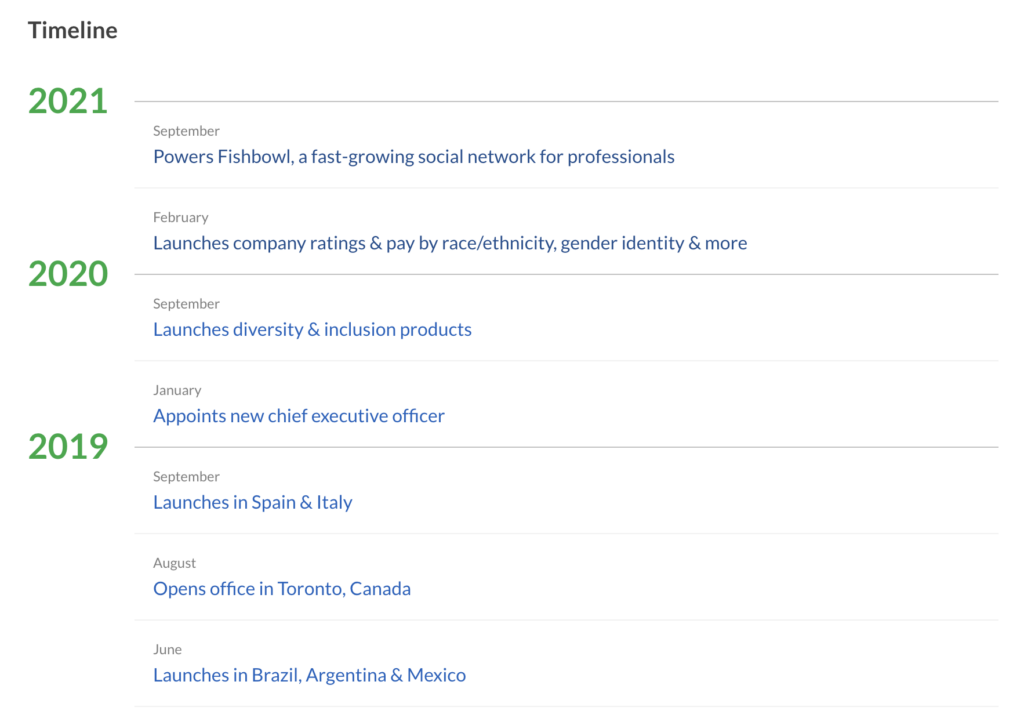
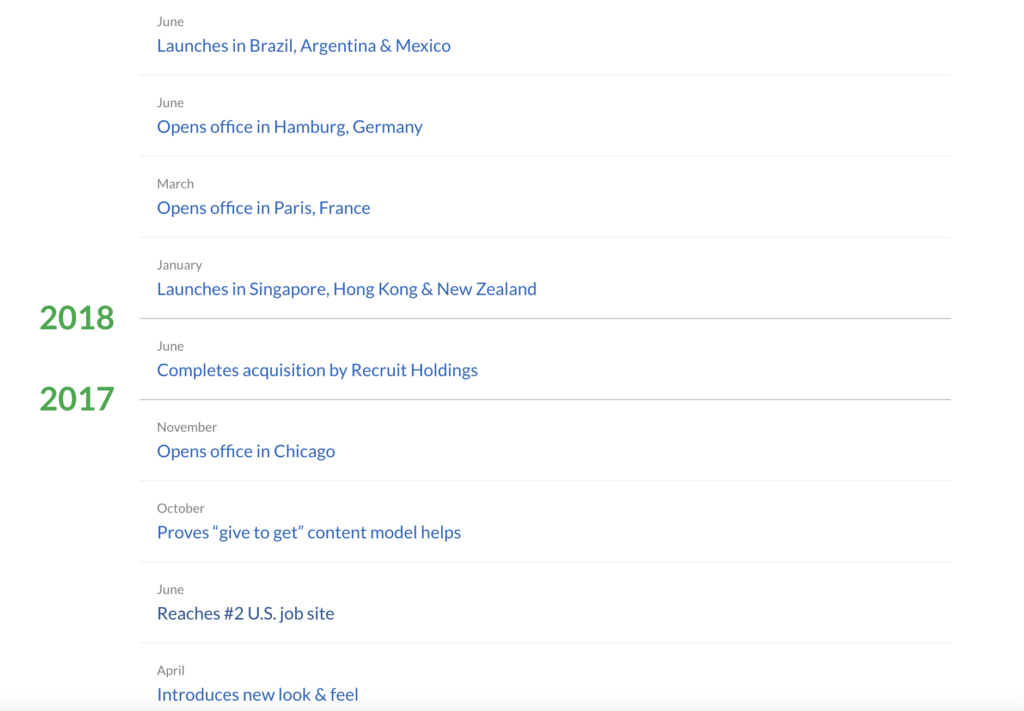


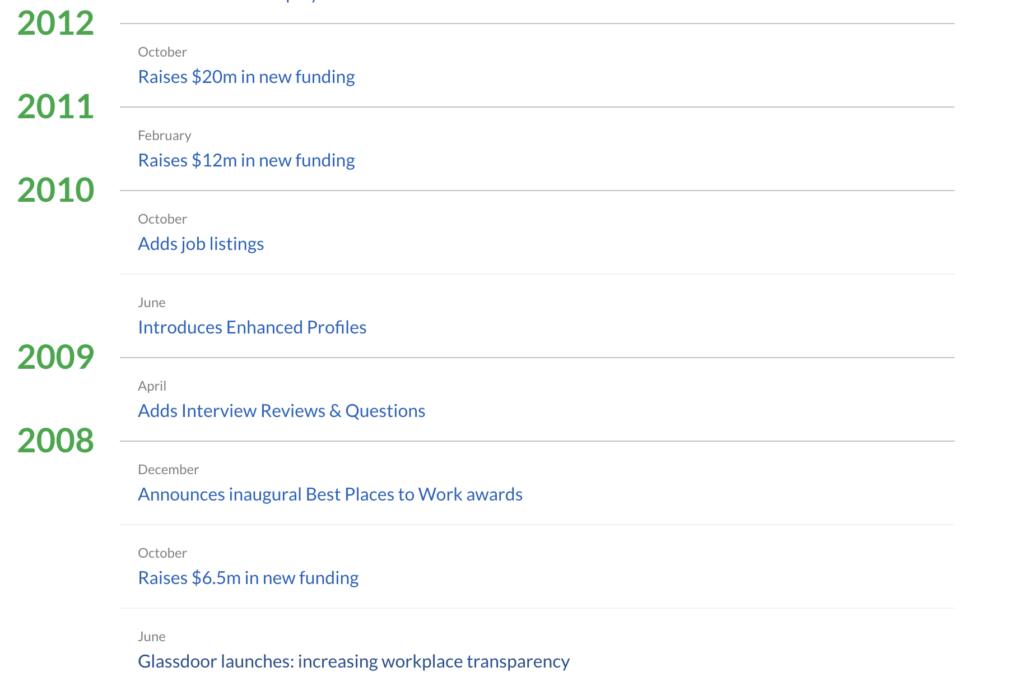
*Timeline Product Feature Example: in 2020, Glassdoor’s data found that one in three U.S. adults were looking or planned to look for a new job. Glassdoor took this intel and ramped up its value offering by unveiling two new tools to empower job seekers with more efficiency [3]. To Glassdoor’s benefit, a third-party analysis of more than 30 million applications showed that candidates who applied through Glassdoor were twice as likely to be hired than those who applied through other job sites [8].
Works Cited
[1] “About Us,” Glassdoor About Us. https://www.glassdoor.com/about-us/#:~:text=Glassdoor%20operates%20as%20a%20part (accessed Mar. 04, 2022).
[2] “GLASSDOOR.COM LAUNCHES PUBLIC BETA, OPENING DOORS TO EMPLOYEE SALARIES, BONUSES, REVIEWS AND RATINGS AT ANY COMPANY FOR FREE,” Glassdoor About Us, Jun. 11, 2008. https://www.glassdoor.com/about-us/glassdoorcom-launches-public-beta-opening-doors-employee-salaries-bonuses-reviews-ratings-company-free/ (accessed Mar. 05, 2022).
[3] “Glassdoor Launches New Tools To Help Job Seekers Land The Right Job In 2020,” Glassdoor About Us, Jan. 23, 2020. https://www.glassdoor.com/about-us/product2020/ (accessed Mar. 03, 2022).
[4] “Glassdoor To Power Fishbowl, A Fast-Growing Professional Social Network,” Glassdoor About Us, Sep. 15, 2021. https://www.glassdoor.com/about-us/glassdoor-powers-fishbowl/ (accessed Mar. 04, 2022).
[5] “How to Be a Digital Platform Leader,” HBS Working Knowledge, Jul. 22, 2019. https://hbswk.hbs.edu/item/how-to-be-a-business-platform-leader.
[6] “Glassdoor Unlocks Employee Sentiment & Pay Data By Race/Ethnicity, Gender Identity & More,” Glassdoor About Us, Feb. 18, 2021. https://www.glassdoor.com/about-us/ratings-salaries-demographics/ (accessed Mar. 04, 2022).
[7] “Glassdoor Myth Busters: Setting the Record Straight | Glassdoor for Employers,” US | Glassdoor for Employers, Jun. 06, 2019. https://www.glassdoor.com/employers/blog/glassdoor-myth-busters/ (accessed Mar. 03, 2022).
[8] “GLASSDOOR FASTEST-GROWING JOB SITE — PUSHES AHEAD AS #2 MOST VISITED JOB SITE IN U.S.,” Glassdoor About Us, Jun. 16, 2017. https://www.glassdoor.com/about-us/glassdoor-fastestgrowing-job-site-pushes-2-visited-job-site/ (accessed Mar. 04, 2022).



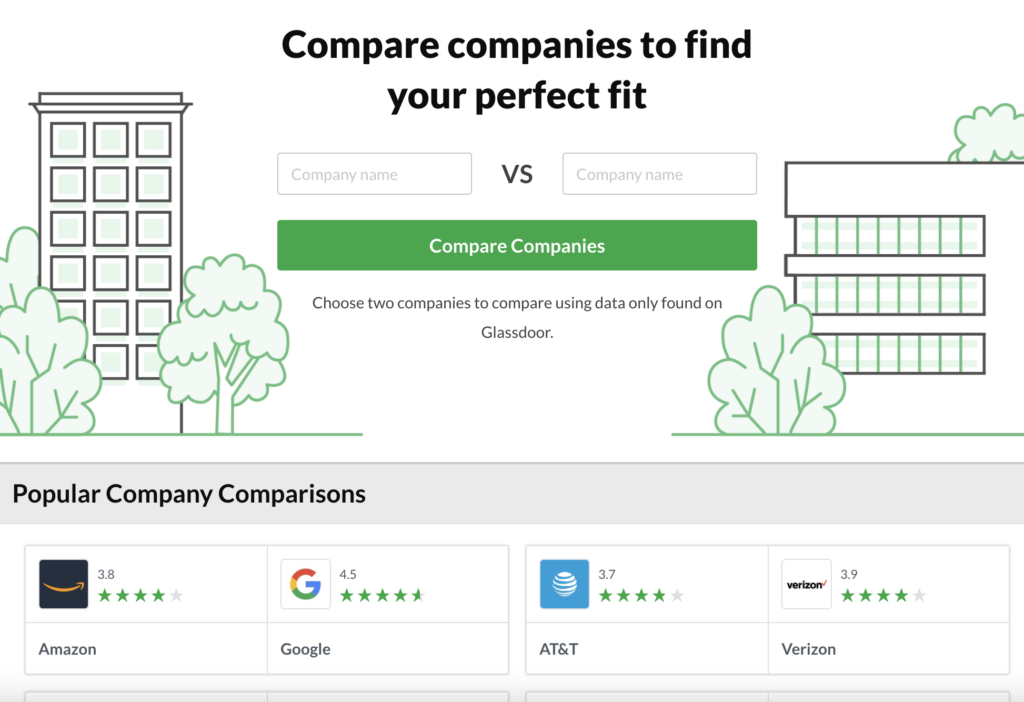
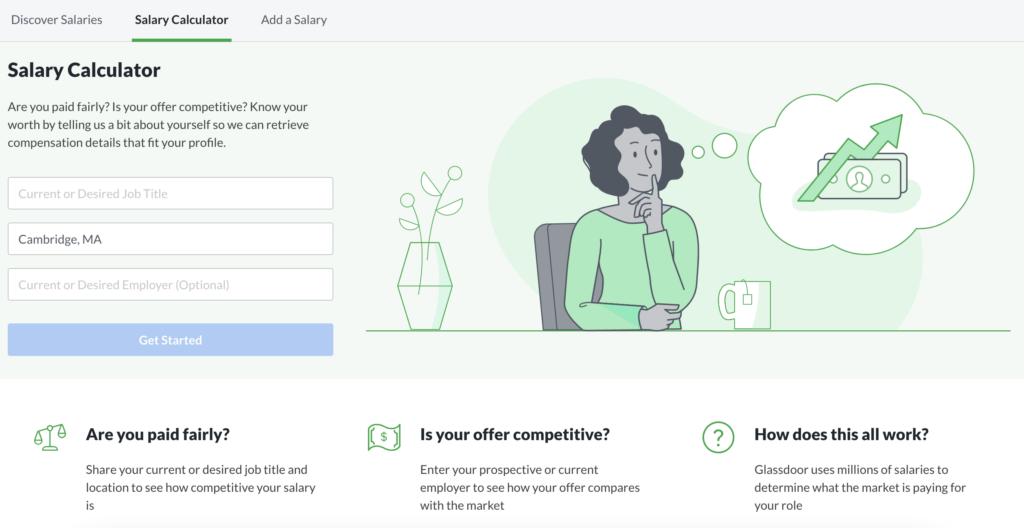
Thanks for a super interesting post, Heili. I find the acquisition of Fishbowl to be fascinating…do you think Glassdoor wasn’t innovative enough around its core platform (e.g., incorporating direct messaging, forums, etc.), and it had to play catch-up to avoid disruption by Fishbowl or Blind? I’ve also always wondered how Glassdoor captures its value from employers – does it charge employers fees for any of its services, does it make money on advertising, or is there some other strategy that they employ?
Great read Heili! Curious as to what you think about the boundary between Glassdoor (private) and Government (public) legislation? I know that Colorado has recently made job postings required to post salaries, and I could see that pro-worker legislation being the long term trend over our lives. In theory, said legislation removes value from Glassdoor, and distributes it. In such a circumstance, how does Glassdoor think of said laws?
Loved this post! Very interesting to see how they have evolved/changed from how many of us once thought of them. I totally agree that “trust” is the focus and now more than ever there’s a great need for this platform and its insights on both sides. Nicely done.
Thank you for the post Heili! It was so interesting to learn how Glassdoor managed to protect data integrity through a two-step model. It would be also interesting to know what minor changes were introduced in the recently acquired companies to align them more with Glassdoor’s commitment to transparency and trust
Thank you so much for sharing, Heili! It is so informative! As a Glassdoor user, I personally are concerned that if the reviews and the salary are accurate, and how Glassdoor make profit, do they take advantage from taking off the negative reviews? Will the employer’s legal counsel write threatening letters to Glassdoor, ordering them to remove all the negative reviews or else they will sue?
Hi Heili, super awesome post! Much in line with what others said – curious as to how you see the rise of competitors like Blind. I’m personally much more attuned to Blind than Glassdoor (mostly cause it feels like Blind is more frictionless to follow due to their active social media engagement) rather than Glassdoor with its paywalls. I’m also curious about impacts of government legislation (like New York City mandating the disclosure of salary with job postings recently) on a key value proposition of Glassdoor… I feel there’s definitely some value that GD could add there!
Thanks for the informative post Heili! Following Sutton’s question, I wonder how Glassdor can pivot with this information to create value for both companies and employees using this large database they now have?
Hey Heili! Thanks for such a wonderful post! I share many of the sentiments our classmates said above. I’m also intrigued by the acquisition of Fishbowl, and it seems like Glassdoor is moving in a very interesting direction! I’m not too familiar with Glassdoor or Fishbowl, and my conception of Glassdoor before reading this was that Glassdoor is a great site to find job opportunities, but it seems like much more than that!
Have you ever used Glassdoor before? If so, what was your experience with it?
Thanks, Heili!
Really fascinating article, Heili. Interesting to hear how their filters and algorithms detect abuse and gaming. Now that Glassdoor has all this data around employee satisfaction, retention and demographics, what would be the best way to transmit this data to companies to help them facilitate their growth? also wonder how Glassdoor is changing the cultural landscape around salary and benefits and if they have a way to assess their global impact?